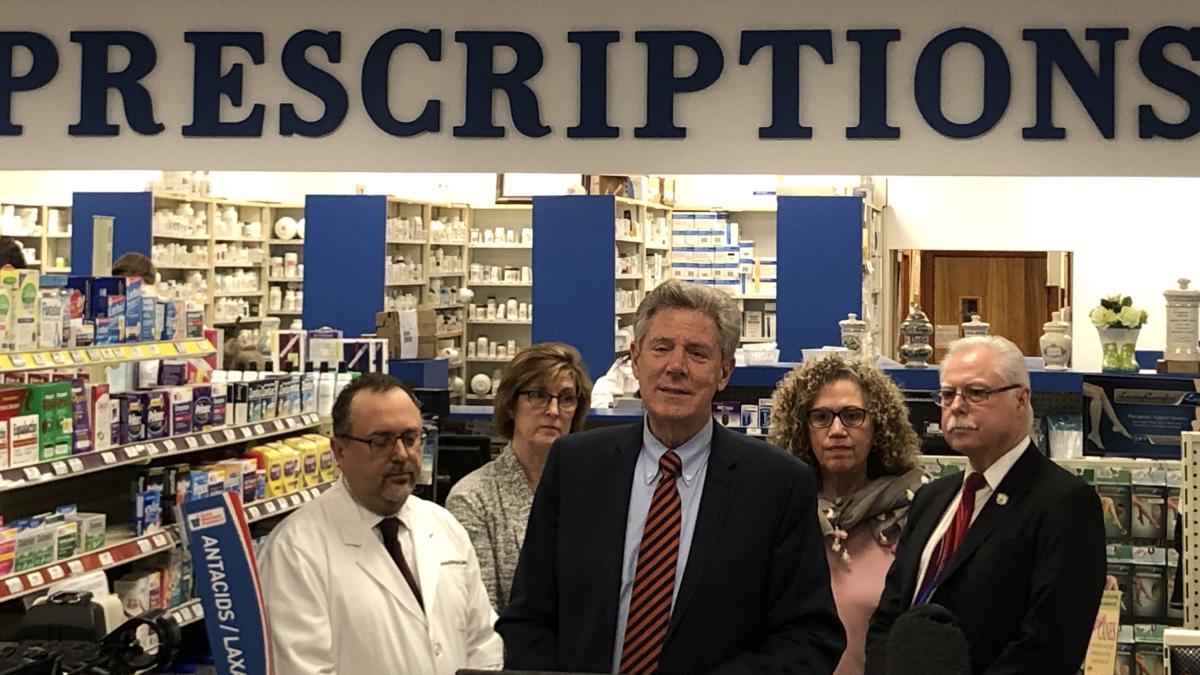Pallone Unveils Policy Solutions to Lower Prescription Drug Prices

New Brunswick, NJ – Today, at Boyt Drugs in Metuchen, Congressman Frank Pallone, Jr. (NJ-06) discussed how barriers to generic drug entry have enabled high prescription drug costs. In an effort to lower drug prices Pallone unveiled policy solutions that will help encourage generics and greater competition in the marketplace. As the Chairman of the Energy and Commerce Committee, Pallone is in the process of pushing numerous bills through his Committee to lower the cost of prescription drugs.
"The American people have been clear: we need to take action to lower the soaring costs of prescription drugs," said Pallone. "These bipartisan bills will lower costs for consumers by removing barriers to competition that prevent cheaper generic drugs from coming to market. Preventing companies from gaming market loopholes is a commonsense approach to reduce costs for consumers right away."
One way to address drug prices is to help generics and biosimilars come to market faster by ending anticompetitive behaviors by the brand drug companies. Today, some drug brand companies are delaying generic and biosimilar competition by using Risk Evaluation and Mitigation Strategies or (REMS) programs to block access to samples of branded drug products. Without access to these samples, generic and biosimilar manufacturers are unable to do the development work needed to bring a high quality, low cost generic or biosimilar to market.
Pallone is ushering the following bills on prescription drugs through the Energy and Commerce Committee.
Drug Development and Barriers to Market Entry: Negotiating with Brands
- H.R. 965, CREATES of 2019
The CREATES Act focuses on deterring brand drug manufacturers from using restricted distribution systems— including safety protocols known as REMS—to delay or impede generic competition on both the front end of generic drug development and the back end of market entry. The bill would allow a generic manufacturer facing delay tactics to bring an action in federal court to obtain the samples it needs. Courts would be authorized to award monetary damages sufficient to deter future gaming by brand manufacturers. It would also clarify FDA's discretion to allow generic manufacturers to operationalize equivalent safety protocols in a separate system instead of entering a shared safety protocol with brand manufacturers, provided that such separate protocol meets the same safety standard as the original system.
- H.R. 985, FAST Generics Act of 2019
The FAST Generics Act also focuses on deterring brand drug manufacturers from using REMS and other restricted distribution systems to delay generic competition on the front end of generic drug development and the back end of market entry. This legislation establishes an authorization process for generic manufacturers to access samples and prevents brand manufacturers from denying implementation of a shared REMS. The legislation also defines restricted distribution programs generally, including abuse of a REMS program, as anticompetitive behavior. Further, the legislation allows generic manufacturers who have been impacted by these abuses to sue the license holder for injunctive relief and damages.
Market Abuse Barriers: Eliminating Taking Undo Advantage of Industry Paying to Delay Competition
- H.R. 1499, Protecting Consumer Access to Generic Drugs Act of 2019
This legislation would make it illegal for brand-name and generic drug manufacturers to enter into anti-competitive agreements in which the brand-name drug manufacturer pays the generic manufacturer to keep more affordable generic equivalents off the market.
- H.R. 938, BLOCKING Act of 2019
This legislation strives to discourage taking undo advantage of 180-day exclusivity by a first generic applicant by allowing FDA to approve a subsequent generic application prior to the first applicant's first date of commercial marketing when the following four conditions have all been met: the subsequent application is ready for full approval; a minimum of thirty months has passed since at least one first applicant submitted their application for the drug; any related patent litigation has been fully resolved; and no first applicant is approved.
- H.R. 1506, Fair and Immediate Release (FAIR) of Generic Drugs Act
This legislation attempts to disincentivize both taking advantage of 180-day exclusivity by a first generic applicant and patent settlement agreements that delay commercial marketing. This legislation would do so by allowing any generic filer who wins a patent challenge in court or is not sued for patent infringement by the brand company to share in the 180-day exclusivity period of a first applicant. It would also hold the first applicant to the launch date that was agreed to in any patent settlement agreement.
Patent Listing Barriers: Curbing Abuses of Patent Listing
- H.R. 1503, Orange Book Transparency Act of 2019
The Orange Book is an interactive, electronic database of all approved drugs and their relevant patents and exclusivities. This book is often relied upon by generic manufacturers in making development decisions. This legislation would help to ensure that the Orange Book is accurate and up-to-date, by requiring manufacturers to share complete and timely information with FDA so that the agency can maintain an accurate Orange Book, as well as ensuring that patents listed in the Orange Book are relevant to the drug product. Patents found to be invalid through a court decision or a decision by the Patent Trial and Appeal Board would be required to be removed promptly. FDA is also directed to reconsider the types of patents that should be listed in the Orange Book within one year of enactment.
- H.R. 1520, Purple Book Continuity Act of 2019 The Purple Book is a less transparent and, ultimately, less helpful data source of the patents and exclusivities related to biologics. The bill would amend the Public Health Service Act to codify publication of approved biological products in the Purple Book in a similar format and with similar requirements to the Orange Book, specify that the Purple Book should be published electronically on FDA's website and updated routinely, and direct FDA to consider the types of patents that should be listed in the Purple Book.